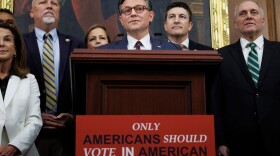Marianne Williamson may be the most unconventional candidate of the primary season.
She’s the author of 13 books, most of which are categorized as self-help (much to her displeasure). She gives talks, mostly of a spiritual nature, and she often makes campaign stops at yoga studios and meditation centers.
But she -- and her platform ideas -- have people talking, which is a big plus when you’ve got 20 or more opponents. And that buzz has helped her stay in the race.
One of the aspects of her campaign that has received a lot of attention is her emphasis on the "politics of love" and her plans to address the polarization that has plagued the country.
“I don’t think that Congress is the only important element here," Williamson told KNPR's State of Nevada, "I think the most important element is the people of the United States. When the political establishment talks about how divided the country is, let’s remember that they themselves are the dividers.”
She said people want to move beyond the divisiveness, and when they become "awakened as citizens," they want to take more responsibility for talking to their representatives about what they want.
Williamson did point out that if Republican Senator Mitch McConnell is still the majority leader when she's president, he will continue to do what he has done in the past.
Many Democrats have blamed McConnell for standing in the way of the forward movement of legislation passed by the Democratically controlled House but blocked in the Senate.
Williamson said she wouldn't be "timid with executive authority" if she were elected.
“If the consciousness in the country is such that it would elect me president, then it's not an unreasonable thing to think that the consciousness of the president of the country just might be such that we would have a Democratic Senate, too,” she said.
President Trump and his base
“I think one of the things that has been most horrifying -- for those of us who are not Trump supporters -- is how unabashedly he has made it clear that to him his base is who he’s here to be president for. And the rest of us, it’s almost a feeling of, ‘You guys can go to hell,’” she said.
Williamson added that she never voted for President George W. Bush but she always felt that he was trying to be the president for the entire country, not just the group of people who voted him in.
“If I’m elected president, I will be president of all the people. I will be working on behalf of everyone regardless of whether they like me or not,” she said.
Reparations for descendants of slaves
“By the middle of the 20th Century, the idea of reparations -- the idea of financial remuneration on the part of a people that have wronged another people -- is considered reasonable and this is -- in the case of the United States and the descendants of slaves -- something that has simply not been done yet. I think that it will help to end the aberrational chapter of our history and begin a new one”
Williamson said one of the main themes of her teachings is that you can't have the future you want until and unless you're willing to clean up the past.
She believes that racism is an original character defect of the United States and that many people are "undereducated" about the history of race in America.
Williamson said people don't understand how long slavery went on in American and how long the racist policies that followed it continued.
She also noted that Germany made major repayments to the Jewish community following the Holocaust and the United States has repaid survivors of Japanese internment camps.
And as far as source of the money -- $500 billion over 20 years -- that her plan calls for, Williamson said $760 billion is spent every year on the military.
She considers reparations to be an economic stimulus that would be spent on economic and educational renewal.
“It was established just recently that if black families manifest as much wealth as white families, our economy would be $1.5 trillion larger,” she said.
The presidential hopeful has no problem with any backlash that would be directed at her if her plan was implemented.
“I’m not interested in the politics of people-pleasing," she said, "I don’t think that a leader is supposed to act according to what the leader thinks people want to hear. I think that the leader is supposed to say, ‘This is what I believe we should do.’ I think we need more than just random acts of kindness. I think we need huge, strategized acts of doing the right thing.”
Affordable housing
“Of course, we have an affordable housing problem. Of course, we have a hunger problem. Of course, we have a homelessness problem, because we have an unbelievably unjust economic system at this moment,” she said.
Williamson said there has been a "massive transfer" of wealth over the last 40 years from average people into the hands of a wealthy few. She added that the continued economic stress from it has caused public suffering.
She said the housing side needs to be addressed with government tax incentives and policies. But the underlying cause needs to be addressed by "holding a virulent strain of capitalism accountable for those injustices."
Impact of climate change on people of color
“We need an entire office of environmental justice that is part of the EPA and also part of the Justice Department,” she said.
Williamson pointed to the water crisis in Flint, Michigan, and another one in South Carolina as examples of how people of color are being impacted more by water pollution.
She said that a person of color is more likely to live near a pollution-spewing factory, which increases the chances of health problems from diabetes to asthma.
Addressing climate change globally
“We need a World War II-level mass mobilization to not only stop climate change -- we need to reverse climate change," she said, "If we do not do this and take these radical measures and rise to the occasion of a World War II-level mass mobilization within 12 years, we could have a level of social collapse around the world even unseen in the modern era.”
Food shortages and economic collapse could also result in non-action, she said.
Williamson supports reforestation, efforts to get to zero-carbon emissions and a plant-based diet to cut back "animal-factory farming."
She said it is time to see climate change as the climate emergency that it is.
Department of Peace
“We need the equivalent of the health and wellness space in terms of healing the body politic,” Williamson said.
She said society has come to learn that you have to cultivate your body's health instead of waiting for a disease and then going to a doctor to treat it.
“The same is true for war and peace. We can’t endlessly prepare for war. We also have to cultivate peace,” she said. “War is the absence of peace. Peace is not the absence of war.”
Williamson said there are times when military action is needed to defend the country or allies, but she doesn't believe that is what is going on right now.
“So much of our national agenda is dominated not only legitimate security needs but by short-term profit maximization for huge defense contractors, and that’s what needs to stop,” she said.
The candidate said of that $760 billion spent on the military every year, only about $40 billion is spent on the State Department and efforts in that department to develop stable, democratic countries.
She believes the country needs to start to see large groups of desperate people as a national security risk, and if we want a safer country, we need to decrease human despair around the world.
Williamson would like to see cultivating peace as a core principle to guiding public policy.
Relatability to the voters
“I’ve spent a 35-year career working up close and personal with people in their darkest hours. That is what my career has been,” she said.
Williamson said she is the person people call when the worst parts of their lives are happening, from a cancer diagnosis to a divorce. She said the intimate knowledge of a crisis has given her insight into how it can transform a person.
She said people can be their most noble and intelligent in a time of crisis.
In justifying her candidacy, she said she believes she has seen the real impact bad public policy can have on people's lives and she knows how to transform people from inside to effect change on the outside.
Marianne Williamson, author and Democratic presidential candidate










